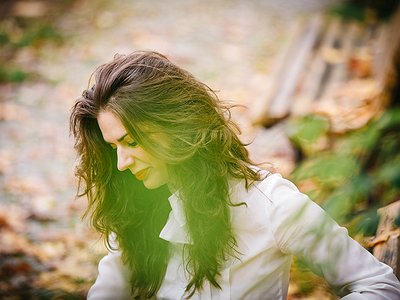Part 1
Name: Sophie Tassignon
Nationality: Belgian
Occupation: Vocalist, composer, songwriter, sound artist
Current Release: Mysteries Unfold on Rarenoise Records
Recommendations: The film « The Sacrifice » by Andrei Tarkovsky (1986); The album « Iron Lung » by Gorilla Mask (Clean Feed, 2017)
If you enjoyed this interview with Sophie Tassignon, her excellent website is the perfect place to find out more about her and her work.
When did you start writing/producing music - and what or who were your early passions and influences? What is about music and/or sound that drew you to it?
I wrote a handful of songs during my teenage years. During my studies at the Royal Conservatory in Brussels I started working more seriously on composing and arranging. I recorded some of those pieces in 2005 with my Belgian band ZOSHIA. At that time my writing was very jazz based yet I was trying to make the music go somewhere unusual.
My early passions and influences included Billie Holiday, Sarah Vaughan, Miles Davis, Chick Corea, Joni Mitchell, Jeff Buckley, Russian folk music, Jacques Brel, but also Berio, Ligeti, Bartók and a lot of films. I discovered Fellini, Cassavetes, Bergman, Tarkovsky, and many others whose work included very specific atmospheres, which had a big influence on my writing.
As for sound and music, I was very drawn to the emotional elements I heard in the playing of certain musicians. In contemporary music I was always drawn by the intricate textures within the compositions. When you listen to some of Ligeti's choir work, for example, it is unbelievable - absolutely haunting! Or Berio ... His Sinfonia for 8 voices and Orchestra is just breathtaking!
For most artists, originality is first preceded by a phase of learning and, often, emulating others. What was this like for you? How would you describe your own development as an artist and the transition towards your own voice? What is the relationship between copying, learning and your own creativity?
My musical journey started very young, with learning classical piano at the age of four. The classical repertoire I was practising over more than a decade definitely deepened the harmonic and melodic path, which lies behind every one of my compositions. In the classical piano repertoire there are a lot of intricate secondary voices played between the melody and the bass. For example, it's fascinating to follow the lines in some of Chopin's works. I absolutely love the chromatic lines in Chopin's Etude Op. 10, No. 6, in E-flat minor, which has haunted me since I was a teenager. This piece is very dark, and in the middle section the chromatic accompaniment snakes between the bass and melody. This particular aspect among others has had a huge effect on my writing. I find the development of this piece, both melodically and harmonically, simply breathtaking!
When I started working with the freely improvised electroacoustic duo 'Charlotte and Mr. Stone', our pieces would always be shaped into a form. It is something that became very necessary to me. I am not interested in improvising music, which doesn't have a conceptual development of some kind. Some musicians experiment in sound with a very different goal, which can be hypnotic, but often avoids or excludes harmonic and melodic content. I am more interested in the evolution of sound and concept. On Mysteries Unfold I wanted to work intensely with harmonic development and embedded counterpoint structures, incorporating the occasional use of accompanying soundscapes. In fact, this record is the sum of all my influences: classical, contemporary, rock, pop, folk, fado and electroacoustic, among others.
It's an interesting question to see when and why one finds the own voice as it's maybe not necessarily clear when exactly this happens. With Mysteries Unfold I wanted to create an album that I would truly enjoy, and this involved much difficult decision making. I often felt as if I had to surrender to a specific decision during the production process, although at many other moments I would suddenly feel “this is it!” - the choice I made just felt right and seemed to come straight from the subconscious.
I think we internalise all of our musical experiences and life moments in a subconscious world of their own. Our authenticity can be blocked by creating art simply to please others. Therefore I prefer to follow the “subconscious” path and believe in my gut feeling when it comes to composing and creating music.
What were your main compositional- and production-challenges in the beginning and how have they changed over time?
I have to smile, as this question brings me back to the middle of the 90s. I was about 15 when I had written my first real song. At that time technology had not entered our homes as it has now, so I had to be creative. Luckily my parents owned a small TV which had a mic input as well as a cassette tape player built in. I lay the mic onto a music stand serving as a self made mic stand which I placed next to me sitting at the piano so I could sing amplified even though my head had to turn to the right in order to reach the mic! I was so happy though that I could sing amplified while accompanying myself on the piano.
At that time, the only thing I could find to record my song was a tape recorder. I recorded the melody and chords with the tape recorder of the TV and the sound was already pretty awful. In order to record second voices, I had to use an additional tape recorder with another cassette. You can imagine the quality of the sound ... It was terrible! And I switched cassette tapes again to record a third voice! So by the end I had a creaking piano sound with a stifled voice and two more voices on top but at least I could create and listen to my song.
When I started using a loop station and later the software Ableton Live, I was facing a lot of technical challenges. I spent an enormous amount of time in my studio with coffee and cookies in order to learn what I needed to for my solo project.
As for the compositional challenges, each piece presents some, whether questions of range or intricacy of rhythm, etc. I often use the piano as a tool for composing. This gives me a huge range to work with. Therefore I always have to be careful and think about each instrument's range but also each player's strengths and possibilities. For Mysteries Unfold the challenge was to keep the album interesting knowing that I had to keep the listener’s attention with only the sound of my voice. It meant that I had to be creative in order to offer a variety of sounds.
Composing is a form of research, which develops one's capacities of expressing emotion on a different level than words. I thoroughly enjoy that process and overcoming the challenges is simply a part of the journey.
What was your first studio like? How and for what reasons has your set-up evolved over the years and what are currently some of the most important pieces of gear for you?
My first and only studio I've had so far is the one I created in my office at home. I built some acoustic panels I can move around in order to block some frequencies and placed my microphone in front of them. Next to it is my desk where I have my computer and speakers, interface and controller. I have an upright piano on the other side of the room and that's all I need.
The pieces of gear I use are:
2 KRK speakers
1 Laptop with Ableton Live software
1 Komplete Audio 6 interface
1 Rode NT2-A mic
1 mic stand
1 KORG Nano controller
Nothing I own is spectacular but for recording a clear voice it works. For the production of Mysteries Unfold I was able to have everything mixed by one of the best sound technicians in Germany, Christian Heck.
How do you make use of technology? In terms of the feedback mechanism between technology and creativity, what do humans excel at, what do machines excel at?
Just by singing into a microphone I use technology. It enhances a lot of subtle colours, which are otherwise not audible to an audience. With the help of technology I can also record vocal textures and use them within my compositions or improvisations. I don't 'transform' my voice but technology makes it possible to have my voice multiplied and positioned the way I want it to be. I can also selectively place the different voices within the sound space, which plays another big role in my music.
Both humans and machines excel at different things and a human using a machine has the potential to excel in a more elaborate or developed way than one without technical tools. Certain goals are impossible to achieve without technology or would require much more time, personnel or money. Technology on the other hand cannot (yet) portray emotion as humans can. For me the use of technology is very interesting when connected to something as real as the voice, because the human voice touches our brains in a very direct and sensitive way. Technology however offers very extraordinary possibilities, many not feasible by humans. That combination is something very special to me.
Production tools, from instruments to complex software environments, contribute to the compositional process. How does this manifest itself in your work? Can you describe the co-authorship between yourself and your tools?
The main tools which further develop my compositional process are a Boss Loop Station and the Ableton Live software. The Loop Station is mostly used to record sonic textures, using repetitions to create an element of motion. The Ableton Software enables me to recreate these looped structures, and to create additional elements to further enhance the composition. They are fascinating tools which can be used in so many ways and contribute extensively to my writing.
Collaborations can take on many forms. What role do they play in your approach and what are your preferred ways of engaging with other creatives through, for example, file sharing, jamming or just talking about ideas?
Collaborations happen for me in the form of playing with other musicians and is something, which I find inspiring and fun. Playing music together and discussing the way we can collectively develop a composition brings new ideas and a consistently fresh approach to live performance. For some more improvised projects it isn't necessary to rehearse. A good conversation around a cup of tea will be all that’s needed to prepare for a concert, and something I also consider a very important part of the process.
I'm lucky to be playing in a variety of projects, all which include fantastic musicians, making each rehearsal and performance a magical moment.






